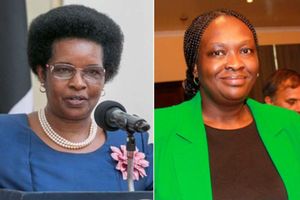Premium
Legal Clinic: I’m ready to file for divorce but...

I am unable to get a copy of the affidavit and would like to divorce her officially
What you need to know:
- First, is to emphasise the legal definition of marriage in accordance with Section 3 (1) of the Marriage Act.
- It is as a voluntary union of a man and woman, in a monogamous or polygamous relationship that is registrable at the state law office. Upon registration, the union binds the formerly unattached pair into husband and wife.
- This does not in any way make lesser society perspectives, of what constitutes marriage.
- Many communities culturally consider man and woman who stay together as husband and wife, if at all a pre-stay-together process was conducted paving way for negotiations and consensus to recognise the particular pair as so.
Dear Sir,
I have been separated from my wife since 2007 and have not spoken to one another since 2016.Our marriage was a civil one. However, we swore an affidavit so that she could get owner occupier house allowance. I am unable to get a copy of the affidavit and would like to divorce her officially. She has reverted to her maiden name.
Please assist.
I look forward to your reply.
George
Hi George,
This conversation begins on a sombre legal note. If the affidavit of marriage is the only document you rely on to motivate divorce, without any support of formal customary processes, then what you seek to dissolve is not marriage, although this does not mean that a union of two willing adults did not exist up to 2007. The Marriage Act of 2014 was enacted to rectify possible mischief found in the institution of marriage, in particular the violation of partners’ rights. Yours comes through as companionship that is openly displayed in different forums such as churches, school records, gatherings of friends and family, besides being conducted to imply marriage and therefore considered to be so in social and cultural underpinnings. Following, our discussion should highlight four important concepts that emerge from the scenario you describe.
First, is to emphasise the legal definition of marriage in accordance with Section 3 (1) of the Marriage Act. It is as a voluntary union of a man and woman, in a monogamous or polygamous relationship that is registrable at the state law office. Upon registration, the union binds the formerly unattached pair into husband and wife. This does not in any way make lesser society perspectives, of what constitutes marriage. Many communities culturally consider man and woman who stay together as husband and wife, if at all a pre-stay-together process was conducted paving way for negotiations and consensus to recognise the particular pair as so. This may not necessarily be legal, since the Marriage Act at Section 6 (1-c) directs that any customary union be registered.
Second is your candid declaration that you and the woman referred to as your wife swore affidavits to prove marriage for her to access the employment benefit that accrued from the owner-occupier housing tenure. Prior to the enactment of the Marriage Act (2014), many couples employed this approach to give legal meaning to their unions. This mostly served couples who had committed to each other as husband and wife in a come-we-stay arrangement or customary driven marriages. Affidavits of marriage acted as replacements of marriage certificates, nonetheless, in some common law jurisdictions, seen as independent proof of marriage. In the case of Kenya, this is arguable and could mean you have no marriage to occasion a divorce, since none exists.
Third, is whether, the affidavit, qualified marriage in the eyes of the public, and so should interest the family court to consider claims one may seek before it. Since the Kenyan law provides a pathway to register customary marriages and only recognises five types, the court if moved, and in the absence of a marriage certificate may invite the legal concept of Presumption of marriage. This concept is used to canvass the existence of a marriage where no certificate or legal document exists. Often, it is when the court is forced to consider the rights and interests of a couple who have cohabited for a considerable period of time, that the public has assumed a marriage exists. The court employs the presumption of marriage concept if the lack of it broadens the likelihood of violation for both or one of the partners in a relationship of this nature. Presumption of marriage is invoked in most cases, when claims such as maintenance or share of an estate belonging to a deceased partner are made. The court often anchors their decision to invite this concept on Section 119 of the Evidence Act, where it considers the existence of any fact it thinks likely happened, regarding to the common course of natural events, human conduct, and public and private businesses. Further, where rights of children and women as dependants to a deceased person may be by-passed, the court will invoke Section 29 of the Law of Succession Act to support the section in the Evidence Act. Remember, presumption of marriage does not give rise to any marriage.
Fourth is the concept of divorce, which is a decree of the court to end a marriage recognised in and by law. Unsupported affidavit may mean you have no union to end, a context, lawyers can term as “no marriage Ab initio, meaning no marriage existed from the beginning. Culturally, you may require to adhere to traditional approaches of ending such unions, if at all such exists in your community. Specific recommendation on how to end this union is difficult because of the many aforementioned reasons, within this text.
Mr Mukoya is a lawyer with over 17 years’ experience. He’s the Executive Director, Legal Resources Foundation. Legal query? E-mail [email protected]





